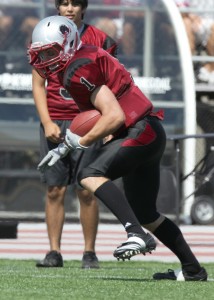MIT Football Captain Goes from Gridiron to MLB Playoffs
-
-
slice.mit.edu
- 2
Filed Under
Recommended
 Mike Fitzgerald '11, quantitative analyst for the Pittsburgh Pirates. Image: Boston Globe
Mike Fitzgerald '11, quantitative analyst for the Pittsburgh Pirates. Image: Boston Globe
From 1993-2012, the Pittsburgh Pirates were the only team in Major League Baseball (MLB) that did not register a single season with a winning percentage above .500, finishing in last place in their division in nine of those seasons.
But on Oct. 1, the Pirates will participate in the MLB playoffs for the second straight year. According to the ESPN-affiliated website Grantland, Pittsburgh’s turnaround is due in part to an analytics-driven front office that includes Mike Fitzgerald ’11.
In his third year at the Pirates’ quantitative analyst, Fitzgerald’s duties includes providing input on player evaluation and roster construction, and a 2013 Boston Globe article credits him for the free agent signing of catcher Russell Martin, one of Pittsburgh’s best players.
According to Grantland, he also routinely meets with the coaching staff before games and is perhaps the only quantitative analyst who travels close to full-time with an MLB team.
“The Pirates’ Sabermetrics Road Show,” Grantland“In his third season with the Pirates, the 26-year-old Fitzgerald has become something of a sabermetric pioneer, the bleeding-edge embodiment of the trend toward teamwide, data-driven decision-making that began before Moneyball and has accelerated since.
In Fitzgerald, though, the Pirates have built a unique bridge between backgrounds. He makes most road trips: If the Pirates are playing, he’s almost always at the park…his role has gradually evolved to incorporate more direct, in-season interaction with coaches.”
 Fitzgerald captained MIT football and had more than 100 career catches. Image: DAPER
Fitzgerald captained MIT football and had more than 100 career catches. Image: DAPER
Slice of MIT interviewed Fitzgerald at the 2013 Sloan Sports Analytics Conference, shortly before the Pirates’ first playoff season in 20 years. He noted an MIT mindset of finding unique solutions to difficult problems, a common situation in Pittsburgh since the Pirates’ player payroll is smaller than teams that play in larger media markets.
“MIT teaches you how to look at something, break it down, and then put it back together,” he said. “I learned that in course 8.01. And it goes even further than that—to the point that you’re inspecting the problem that you’re trying solve and saying, ‘Is there an even deeper problem here?’”
Fitzgerald’s ability to tread between front office executives and professional athletes is rooted in his MIT background. A Course 18 major, he was captain of the MIT football team and his 111 career receptions are fifth-best in Institute history. He interned with the NBA’s Boston Celtics during the 2008-2009 season, and after graduation, worked alongside Engineers teammate DeRon Brown ’10 at ESPN.
“When I finished playing football at MIT, I felt like I had a void,” he says. “I love the framework of being part of a team. I get excited knowing I can do something that has the opportunity to affect how we play on the field, which will hopefully lead to a championship.”








Comments
Emil Friedman
Wed, 10/01/2014 10:05pm
Note to moderator: My previous two points sound very arrogant to me. I would appreciate it if you would delete them.
Nicole Morell
Thu, 10/02/2014 9:12am
Sure thing, Emil.